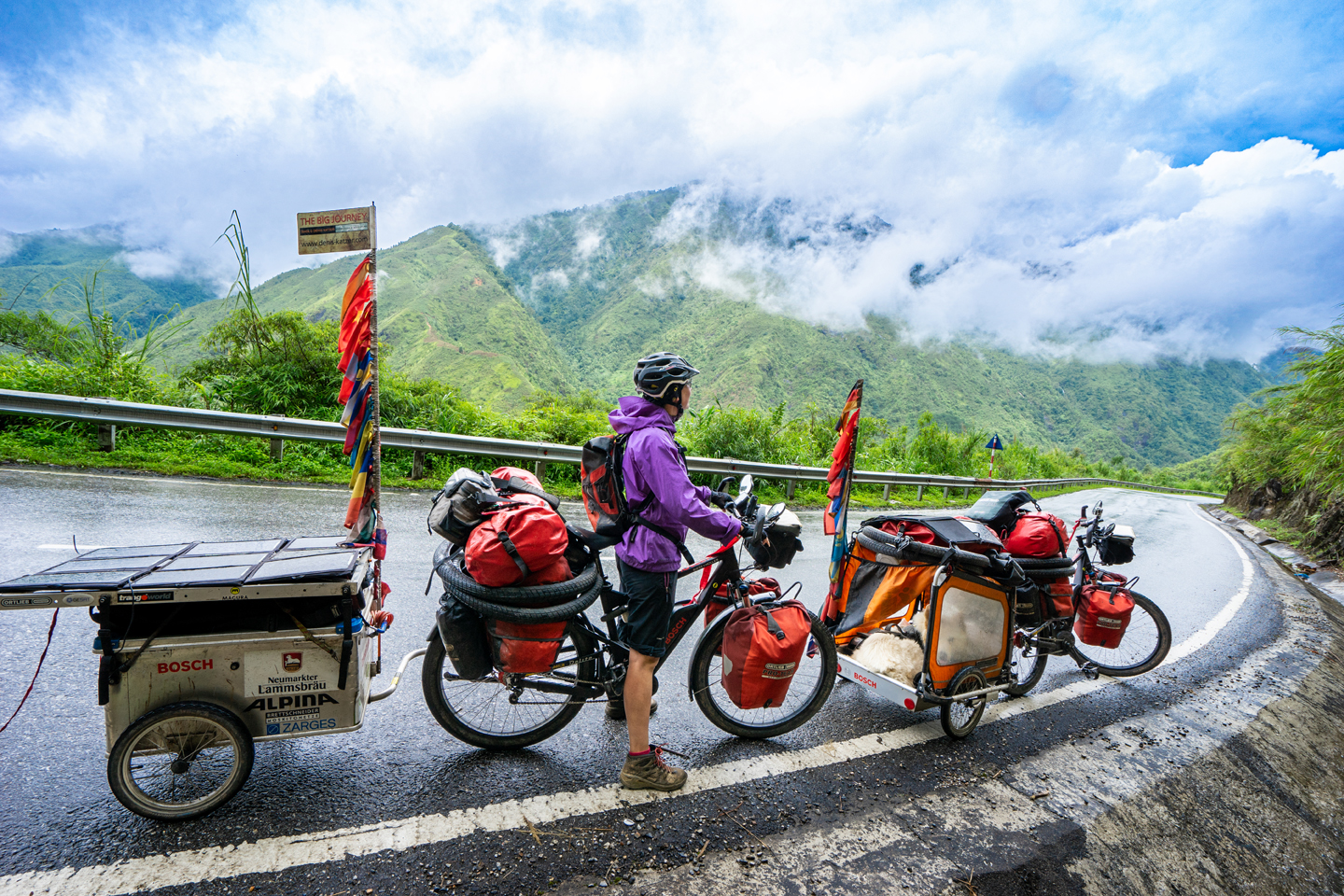
Granddaughter of the last emperor
N 49°28'51.6'' E 105°56'33.5''
Day: 95-96
Sunrise:
06:35 a.m.
Sunset:
7:06 pm
Total kilometers:
14032.96 Km
Temperature – Day (maximum):
1 °C
Temperature – day (minimum):
-1 °C
Temperature – Night:
-5 °C
Latitude:
49°28’51.6”
Longitude:
105°56’33.5”
This morning, too, we feel like we’ve been through the wolf. Every centimeter of our bodies is complaining. We decide to rest for a day. Although it is only 230 kilometers to our destination Ulan Bator, we have to pace ourselves. The unexpectedly high mountains require an enormous amount of strength and demand everything we have in our muscles. Although everyone here also says that the upcoming mountain ranges are not bad, we know where these statements come from. Statements from motorists are to be interpreted differently for a cyclist. Where a driver doesn’t even notice a gradient, a thigh muscle can already reach its limits. And if a vehicle overcomes a 12% or 13% gradient for just 10 minutes, we are usually forced to dismount and have to push for long periods of time. According to our many years of experience, it is important not to use up every last drop of energy in our body and mind on any strenuous journey or expedition. If there are no energy reserves left, accidents can occur due to lack of concentration and wrong decisions. Slow is usually faster. Every expedition trip is only successful if the fun factor is not completely in the basement, but if the days are mainly characterized by joy and joie de vivre and if we reach our destination safe and sound. Of course, circumstances beyond our control can mean that we have to push ourselves to or beyond our mental and physical limits. However, we try to avoid overloading our system as much as possible by taking timely breaks.
“I’ll try to reach Gambold again,” I say and type the number into the phone. Gambold is the long-time Mongolian friend of our German acquaintances. “We’ll let him know you’re coming. You can store your equipment with him during your stay in Germany. He’s a reliable man. I’m sure he’ll also find you an apartment. It’s cheaper than a hotel. You can prepare everything there for your Mongolia expedition and wintering with the Zaatans next year,” they said. Thank goodness Gambold gets in touch. We understand each other immediately. “I’ve been waiting for you for a long time,” he says. “The mountains are to blame. They’ve slowed us down,” I reply and briefly explain the route we’ve covered so far. “Of course I’ll look for an apartment. If you’re on the outskirts of Ulan Bator, give me a call. I’ll pick you up,” he says. We are delighted that this important contact is working. This is a great relief for us.
When we want to sit down at a table in the restaurant in the evening, the friendly owner Munkchah waves us into a private room. May I introduce you to my friend Togtoch? She speaks perfect German,” she says, pointing to a laughing Mongolian woman. “I’m very pleased to meet you,” the friendly and pleasant woman greets us. “Please sit with us,” the two women offer us a seat. It doesn’t take long and we have a lively conversation. We learn that Togtoch is employed by the government and is working on her doctorate in ecology. “I will specialize in desertification. This is a big problem in our country,” she explains.
“Incidentally, I am descended from one of the last Mongolian emperors from the 17th century. Our family tree shows the exact blood connection,” explains Togtoch. “So my mother was a noblewoman and curiously married a monk. That’s a crazy story. During the Stalinist purges in our country in 1937/38, around 38,000 Mongolians were murdered, including almost the entire intelligentsia of the country and around 18,000 Buddhist monks. Around 900 Buddhist monasteries with their valuable cultural assets and libraries were almost all irretrievably destroyed. My mother’s only chance of survival was to change her name and get married as soon as possible. But nobody wanted to marry a noblewoman back then. It was far too dangerous. It was the same for my father. He too could only escape certain death if he married a woman as a monk. But no one wanted to marry a monk either. So my mother and father found each other and survived the disaster.”
We talk to this interesting woman until midnight. When she learns that we want to ride horses to the reindeer nomads in the north of Mongolia next year to spend an entire winter with them in a tipi or yurt, she wants to help us get the important visa. As a rule, tourists are not allowed to stay in Mongolia for longer than one month. However, we need at least 15 months for our expedition. Munkchah is also on fire and says that we can buy the horses and horse and cart we need from her relatives, who, like almost 50% of the population, are still nomads.
We never thought we would be able to make such good contacts so early on, although we realize that we are still a long way from having the residence permit that is so important for us. When we fall onto the mattress late at night, I think about it for a long time. First we want to reach Ulan Bator safely. Then we have to take care of flight tickets, the storage of our trailers, the transportation of our riese und müller back to Germany, and other contacts, and so on. My mind is racing as I hear the lulling song of a lama who is obviously in an adjoining room and is perhaps about to heal a person.

